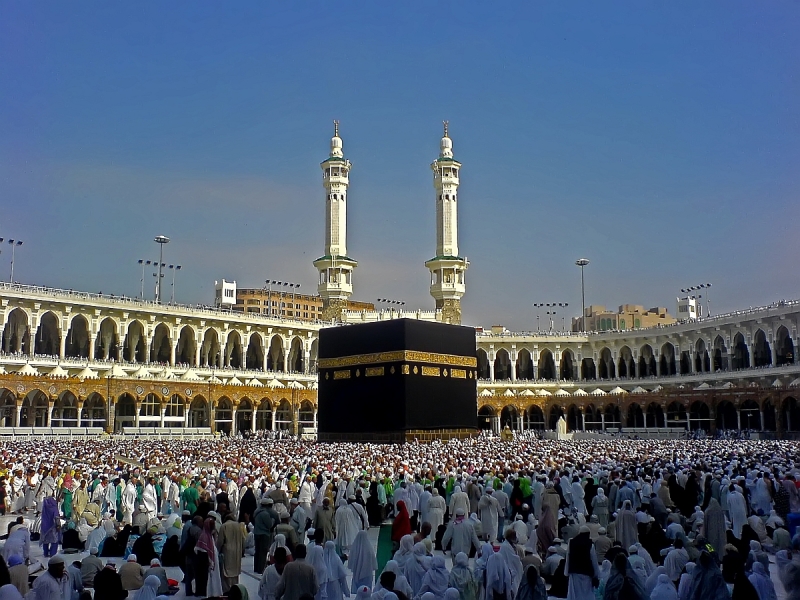The true power of Hajj has been lost. What would we say to Allah about what we did to find it?
Allah سبحانه وتعالى built the foundations of the Islamic society on solid grounds. He started with the individual and nurtured in them the iman and taqwa as the foundations of their personality لَعَلَّكُم تَتَّقُون “So that you may be pious” [al Baqarah: 21]. He ordained obedience to parents to solidify the household and made it second in importance to not committing shirk وَلَا تُشْرِكُواْ بِهِ شَيئًا وَبِالوَ’لِدَيْنِ إِحْسَنًا “And do not associate partners with him, and be good to your parents.” [al Nisa: 36] The ties of kinship to the extended family were bonded by the verse وَاتَّقُواْ اللهَ الَّذِي تَسَاءلُونَ بِهِ وَالأَرْحَام “And be dutiful of Allah who will ask you about it and the relations” [al Nisa: 1]. The community was strengthened with salatul Jumuah, a prayer that all adult men are obliged to attend إذَا نُودِى لِلْصَلَو’ةِ مِنْ يَومِ اْلجُمُعَةِ فَاْسْعَوْا إِلَى ذِكْرِ اللهِ وَذَرُواْ اَلْبَيعَ “If the call to prayer has been given on the day of Jumuah then go to the remembrance of Allah (the prayer) and leave your trade” [al Jumah: 9]. Above the community, He سبحانه وتعالى created for us Wilayaat (provinces) and appointed over them Walis (governors) to deal with its affairs in accordance with the Book of Allah and the Sunnah of His Messenger ﷺ, as detailed to us by the Messenger ﷺ himself in his rule. And for the Ummah as a whole, He سبحانه وتعالى gave us an event that we all participate in, that strengthens us as a nation spiritually and physically. The Hajj.
The whole Ummah participates in greater spirituality during the first ten days of Dhul Hijjah, the best days of the year وَاْلْفَجْرِ وَلَيَالٍ عَشْر “By dawn, and the 10 nights” [Al Fajr: 1]. We fast together on the Day of Arafah and celebrate Eid the day after. For those that are able, and that Allah سبحانه وتعالى has invited to His House as His guests, they go through an amazing spiritual journey that starts well before they arrive at the holy sites and continues long after they have returned home. Whilst there, they are able to see the vastness of colours, cultures and people the Islamic Khilafah encompasses including those that live outside its borders. As if the whole state has assembled in the same place, just like on the day of Jumah where the whole community gather in the same Jami (Mosque). All as one, for the same purpose, chanting the same talbiya and wearing the same two pieces of white, unstitched garments. One Ummah, one cause and one state.
That was how it was. These are the foundations upon which Allah سبحانه وتعالى built our society, but these foundations have crumbled around us and we live only within its memory, as one who visits an ancient site where once a great people lived, but all that remains are its ruins and the legacy of its culture and people. We live in such a time in Islamic history. The unity we once had has been carved up by the national flags of disunity that are for all to see in the Hajj, that divided our hearts and our lands.
It was there at the Hajj that our ruler, the Amir ul Mu’mineen would meet with the tribe leaders and would enquire about their affairs and importantly about the governor he had appointed over them, as Umar ibn Al Khattab (ra) used to do. But today we have no Amir ul Mu’mineen and the governors have become tyrants in every land, entrenching their thrones and allying themselves with the enemies of Islam.
It was there that the hujjaj could themselves meet their Amir, the successor of Rasullullah ﷺ, whose duty is to give the khutbah on the day of Arafah. Instead today the tyrants in our lands do their Hajj with hordes of security and special access, completely separated from the people. What a far cry from the like of Umar ibn Al Khattab, who would sleep peacefully under a tree in Al Madina, with no security, but in peace, and with the love of his people.
Today all these jewels of Hajj, its significance to the Ummah and its state are lost, for we lost our state and live within its ruins. Hajj has purely become an individualistic act and its political power crushed.
The Prophet ﷺ said,«لتُنْقَضَنَّ عُرَى الْإِسْلَامِ عُرْوَةً عُرْوَةً، فَكُلَّمَا انْتَقَضَتْ عُرْوَةٌ، تَشَبَّثَ النَّاسُ بِالَّتِي تَلِيهَا، وَأَوَّلُهُنّ نَقْضًا الْحُكْمُ، وَآخِرُهُنَّ الصَّلَاةُ» “The knots of Islam will be undone one by one, each time a knot is undone the next one will be grasped, the first to be undone will be the Ruling and the last will be Prayer.” [Hakim/ Ahmad] By Allah how true He was. When the knot of Islamic ruling was untied with the dismissal of the last Khaleefah by the traitor Mustafa Kemal in 1924 CE, the other knots of Islam became undone, one by one, including the Hajj.
It was on the plains of Arafah, in his farewell khutbah that the Messenger ﷺ said, «وَسَتَلْقَوْنَ رَبَّكُمْ، فَسَيَسْأَلُكُمْ عَنْ أَعْمَالِكُمْ» “Remember that you will indeed meet your Lord, and that He will indeed reckon your deeds.” So my dear brothers and sisters, as we prepare for this year’s Hajj what will we say to Allah سبحانه وتعالى about what we have done to the Hajj? Lowering it to a purely individualistic affair and removing its power to us as an Ummah. How would we answer our Lord the day we meet Him in a similar circumstance to the hujjaj on the day of Arafah? What would we say?
Abdullah Rashid

